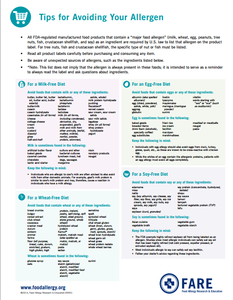Potential Allergens and Food Safety Certification MN
With increasing awareness concerning the effects of food allergens, businesses that sell, produce and serve food products must make an effort to step up their training in regards to foods that can potentially cause allergic reactions in their patrons.
There are 8 distinct allergen groups that have been recognized as cause for serious concern:
- Fish
- Shellfish
- Peanuts
- Tree nuts
- Soy
- Milk and dairy
- Eggs
- Wheat and gluten
Easily recognizable in this list as potentially dangerous allergens are fish, shellfish, tree nuts and peanuts. There should be incredible care taken with these allergens to prevent them coming into contact with any other foods. Someone who is allergic to these can have severe and instant reactions to even the smallest contact.
Steps to Keep Food Product Safe from Allergens
The first and most important step that should be taken to deal with potential allergens is education. Every employee with food safety certification in MN should be aware of what potential allergens are, as well as where they come from. It is essential that a complete list of allergen categories and foods contained in those categories is posted for easy reference for those who work with food.
Along with being aware of what the major allergen groups are, food workers should be aware of which of these allergens are in foods that they produce or serve. It is important to be aware of products that may contain egg, milk, soy or wheat ingredients. Many of these types of ingredients can be known by different names that do not directly indicate they are derived from these allergens. Being familiar with the ingredients of pre-packaged sauces, spice mixes and other food products which are brought in rather than made on-site is essential in preventing allergic reactions.
The third step is to make sure than any preparation tool that has come into contact with these potential allergens is thoroughly cleaned. Common items that contact these foods are oven mitts, tongs, knives, slicers and other production tools that frequently come into contact with food products.
With a little training and diligence, it is possible to significantly reduce the likelihood of accidental allergen contact.



